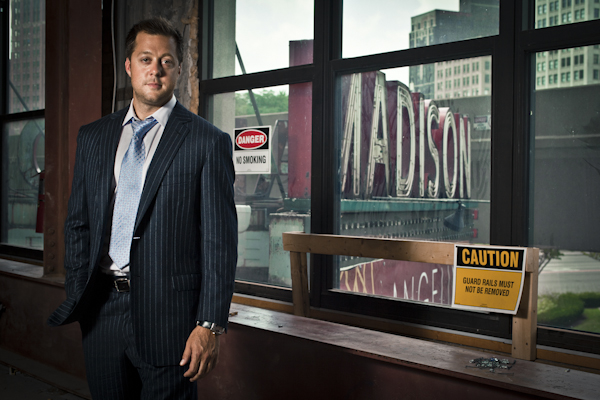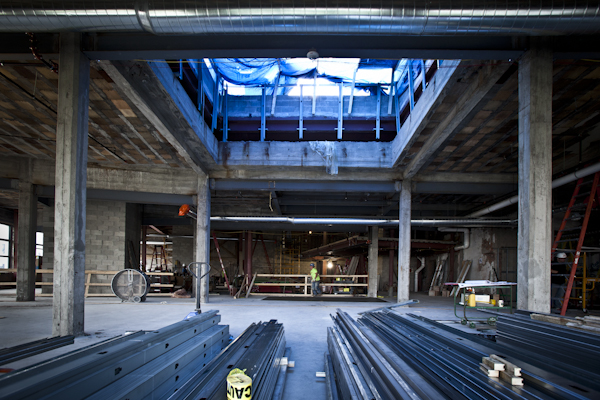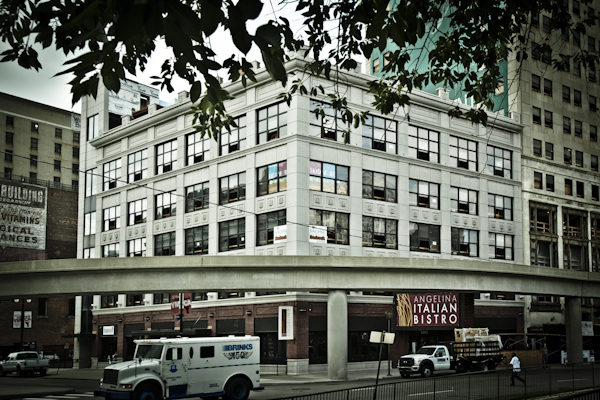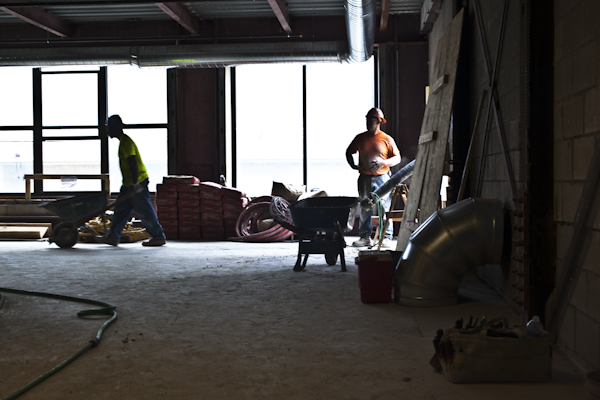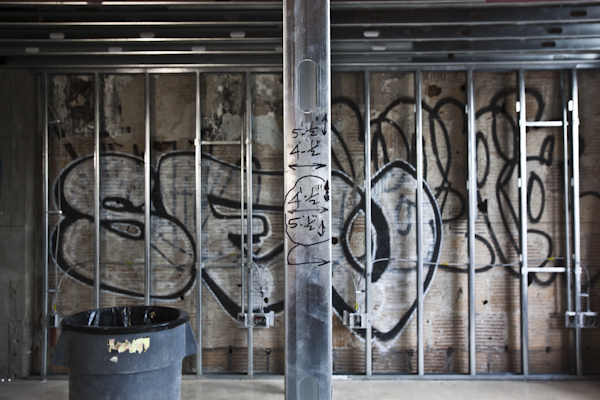Downtown tech talk: Q&A with ‘Webward’ development ace, Dan Mullen
Startup editor Jon Zemke jumps on what could be the story of the summer: the rapid-fire redevelopment of lower Woodward Corridor skyscrapers and other prime real estate. News is breaking seemingly every day off the desk of point person Dan Mullen, who sat down with Model D to tells us what could be next.
When Dan Gilbert talks about transforming downtown Detroit, he probably has attracting people like Dan Mullen in mind.
Mullen doesn’t have a title with Quicken Loans or FatHead or Detroit Venture Partners or Bizdom U or any of Gilbert’s other growing new economy companies or initiatives. But the 30-year-old’s hustle impacts all of those things. He is Gilbert’s real-estate and development point person for many of Gilbert’s downtown Detroit initiatives, such as turning the Madison Building into a entrepreneurial tech hub. By the way, all of the space in that building is spoken for by start-ups and creative firms.
More similar projects are on the way. Gilbert is reportedly in the process of acquiring more downtown real-estate, and he has a new partner. Earvin “Magic” Johnson, the newest investor in Detroit Venture Partners, said he plans to invest in downtown real-estate with Gilbert, bringing investment funds worth several hundred million dollars to bear. All of that promises to create more work for Mullen.
Mullen got his start at Quicken Loans in 2003 as a mortgage banker. He befriended Pat McInnis, then Quicken Loan’s president, who took Mullen under his wing, eventually bringing him onto Gilbert’s executive team. Today Mullen works long days at Quicken Loans downtown offices in the Compuware Building, occasionally shooting hoops at the company’s newly installed 10th floor basketball court overlooking Campus Martius. The Birmingham resident is looking to move downtown as he helps shepherd more and more of Gilbert’s growing empire into the city’s central business district.
“It doesn’t feel like work,” Mullen says. “I love being here and I love what I do. I feel like I am making a difference daily with downtown Detroit and helping rebuild or transform or revitalize or whatever word you want to use. I feel like I make an impact daily helping bring back the heartbeat of Michigan.”
Mullen recently sat down with Model D’s Jon Zemke and talked about redeveloping downtown Detroit, light rail and the potential of luring an Apple Store into Motown.
I can see talent retention as one of your main focuses.
Absolutely. Forty-four percent of college graduates leave Michigan to go to other urban areas. Retaining that young talent and getting them to believe in downtown so they live, work and play here is one of my main missions.
Dan Gilbert and his team have a vision of reinventing Detroit’s economy through social entrepreneurship, a task that is much easier said than done. What type of timeline are we looking at before the city reaches a critical mass of entrepreneurs?
It’s hard to say. In the next 18 months you will see some huge changes. By this fall we’re going to have another 2,000 team members from Quicken Loans moving to downtown. And we have a lot of other real-estate that we’re trying to fill. We’re going to fix them up and start recruiting people heavily to come downtown. Within a year, you will see a lot of these businesses say, ‘Wow. Look at Detroit and what’s happening.’
What’s the timeline for Gilbert’s buildings coming online?
The Madison building will be this fall. Chase will also be this fall. The First National Building should be online by next spring. It has 800,000 square feet, so it’s pretty big. That will be developed in tears as quickly as we can do it.
Give us a beginner’s guide to Gilbert’s “Webward” vision and how it relates to Snyder’s Michigan 3.0 vision?
We have coined from Jefferson to Grand Circus Park, Webward Avenue. That’s our Phase 1 for recruiting and retaining as many creative businesses in that area as we can. We want that area of Woodward to be known as the place where you can graduate from college and go to work in this area because it has cool technology and creative jobs.
The Madison building is the catalyst for Webward. That’s going to have a co-working space where you can literally walk off the street and work in the Madison for the day. We talk about living, working and playing here. This will give them an outlet for working here. It will also have a 150-person auditorium where we host lots of cool technology events and cool creative summits. It will also have a roof-top deck that overlooks Comerica Park. We’re building it out to be a really cool, beautiful space.
Gov. Snyder talks about Michigan 3.0 as his vision of transforming the state’s economy from it’s industrial roots (Michigan 2.0) into a new economy based on innovation, entrepreneurship and technology. It sounds an awful lot like Gilbert’s vision.
Both of those visions parallel very nicely.
Conventional wisdom says Michigan too often ends up with the fuzzy end of the lollipop when it comes to promising homegrown start-ups that receive investments from out-of-state venture capital firms. Do you think Detroit Venture Partners can flip that dynamic on it’s head?
Absolutely. Not only is it a capital investment, but it’s a lot of hands-on mentoring. They’re actually going to be headquartered inside the Madison building. The idea is to scale those businesses so they move somewhere else in the Webward corridor.
Two years from, can we expect to see that produce a large concentration of businesses here?
I can’t speak for Detroit Venture Partners, but I know their strategy is to do just that. Group-on got its start in Troy and Ann Arbor. If we would have had this in place then, we could have taken a stab at them and brought them down here.
How big of a role does something like the Live Midtown incentive play in building up that core city and attracting talented young people?
It plays a huge role. It incentivizes you to live, work and play in downtown Detroit. It opens the doors for people who want to relocate down here.
What can you tell us about incentives to attract downtown workers to live closer to where they work?
I really can’t comment on that right now. It’s still in its infancy. We have a lot of partners so there are a lot of other folks involved.
Yes or no. Is Woodward light rail a game changer for downtown Detroit?
Yes.
The Woodward corridor?
Yes.
How the region is perceived?
Yes. Urban areas are known for walkability. That’s what makes them cool and creative. Being able to jump on a train and zip up to a ball game within five minutes and then back to work.
Dan Gilbert has been aggressively acquiring downtown skyscrapers, including a building or two that might have been in danger of going vacant or worse had he not stepped in. This is in the midst of a few long-awaited projects finally getting off the ground, like the Broderick Tower renovation. Will Tigers’ fans who live downtown be able to walk to Comerica Park and look out at the skyline and not see a vacant skyscraper in 10 years or even five years?
That’s the plan. I can’t give you a 100 percent guarantee but we are all working so that in the next 5-10 years you can come down here and it is just live with a lot people.
Gilbert has made creating a vibrant retail presence one of is next priorities for downtown, a goal that has been stubbornly elusive over the last few decades despite some commendable attempts to achieve it. Why do you think this time will be different?
Highlighting our development and redeveloping those other buildings is going to attract a lot of people. Us doing what we’re doing is really going to help attract others to come down.
What are the chances we will see an Apple Store downtown in the not-too-distant future?
It’s a dream. I have no idea.
Jon Zemke is the Startup News Editor for Model D and the Managing Editor for SEMichiganStartup.com. He conducted and condensed this interview. His last feature was Prime mover: Paxahau’s Jason Huvaere on Detroit techno, the business and the brand Model D.
